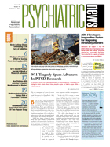September 11 is not a day, said Robert Ursano, M.D.
"September 11 stands for a series of events and challenges to our health and national security," said Ursano, chair of the Department of Psychiatry at the Uniformed Services University of the Health Sciences in Bethesda, Md.
The terrorist attacks on Washington, D.C., and New York and the plane that crashed in Shanksville, Pa., raised questions and taught lessons over the intervening years to many who study the psychiatric implications of disasters.
The events of a decade ago were followed by other anxiety-provoking events: anthrax attacks and the implicit specter of chemical and biological weapons; the Iraq and Afghanistan wars, the latter the longest war in our nation's history; and the recent global economic disaster.
Still, much of the shock of September 11 came from the puncturing of a sense of safety that had accreted since the last big attack on U.S. soil six decades earlier.
But Pearl Harbor was far away from the experiences of most people in the United States, said Stevan Hobfoll, Ph.D., a professor and chair of the Department of Behavioral Sciences at Rush Medical College in Chicago and a leading theoretician on the effects of trauma.
America's geographic separation from Europe and Asia, said Hobfoll, "gave us a sense of both isolation and invulnerability" even after terrorist attacks were carried out on those continents.
But September 11 changed that, at least for a while. "There was a huge—and maybe exaggerated—feeling of vulnerability," said Hobfoll. Reminders of the day are with us all the time.
"Every time you go through security lines at the airport, it's a reminder," he said.
"September 11 was a national transforming event," said Ursano. "The day and its aftermath created a vision of America as vulnerable to attack and a nation that has spent a decade responding to that risk."
"September 11 caused me to think harder than I had before about the psychiatry of disasters," said Carol North, M.D., a professor of psychiatry at the University of Texas Southwestern Medical Branch in Dallas.
North has studied the psychiatric effects of disasters, terrorism, and other trauma, including the World Trade Center attacks and the Oklahoma City federal-building bombing.
"September 11 was more complex than we thought," said North in an interview with Psychiatric News. "It was not well contained. A lot of people were affected in many ways, more than in many previous disasters."
The event was not just a physical attack that caused the death of thousands, she said. "The symbols of the nation were struck." Also, a broad network of affected families and friends emanated outward across the country from the direct victims.
"It reached into people's hearts in many ways," she said.
Elspeth Cameron Ritchie, M.D., a former Army psychiatrist and now medical director of the District of Columbia Office of Mental Health, sees several changes in the response to disasters since the events of September 11.
Clinically, in 2001 the idea of mental health debriefing still held sway. Today there is a more nuanced response to trauma, she said.
"First, you have to do an assessment, then—if needed—try an intervention," she said. "That may be mental health first aid, it may be debriefing, it may be referral, it may be nothing."
On a systems level, the place of disaster response in the consciousness of psychiatrists is much greater today, said Ritchie.
"There is a greater focus on the chain of command, jurisdictional issues, on who is in charge," she said.
Since then, all APA district branches have been urged to appoint a disaster-response chairperson, and psychiatrists in each district branch should know who the local disaster coordinator is and what the disaster plans are.
They should also understand the overall local incident command structure that oversees the response to a disaster or other traumatic event, said Ritchie.
"But all the plans in the world don't do any good unless people know what they are, train for them in advance, and make them work smoothly," she said.
Hobfoll sees some improvements, but setbacks as well.
"Governments at all levels have improved their disaster-response systems," he said. Hurricane Katrina, though, was a step (or more) backward. A complete and utter embarrassment, a study in incompetence at every level," he said.
Disasters, whether they are caused by hurricanes or tsunamis, war or terrorism, will inevitably occur again, so the mental health community must be prepared for the inevitable consequences.
"Mental health is often left out of the equation, but after 72 hours, the main questions are what to do with the bodies and the mental health issues," Ritchie pointed out. "We have to be ready to respond to the long tail aftermath of many of these events."
"There is no ‘day’ to remember," Ursano reiterated. "It is an entire decade, and we have learned that not only those who face trauma—victims, first responders, soldiers, sailors, airmen, and marines—but it's also their families who teach us as we strive to care for their mental and behavioral health needs."
